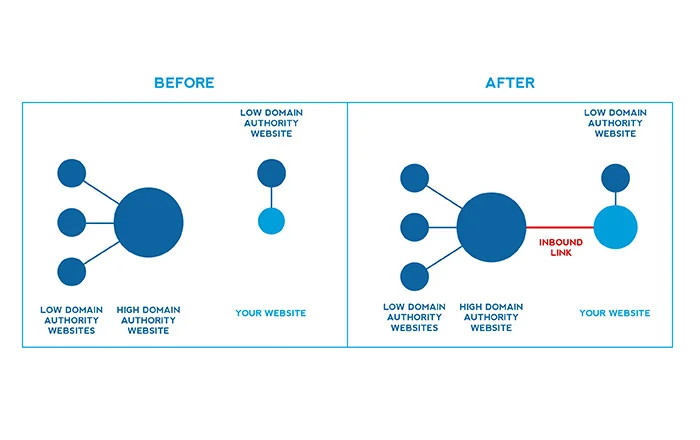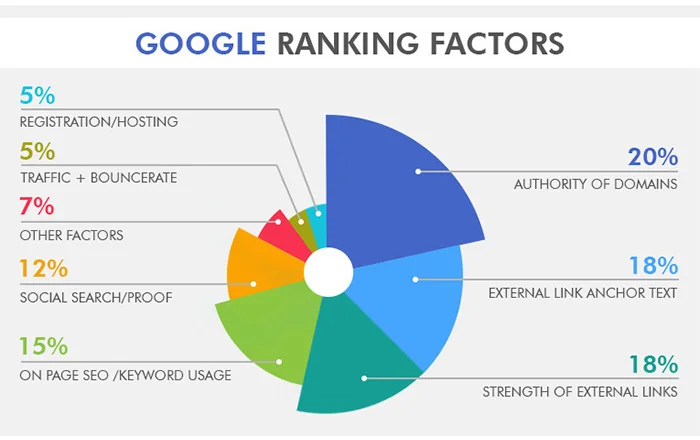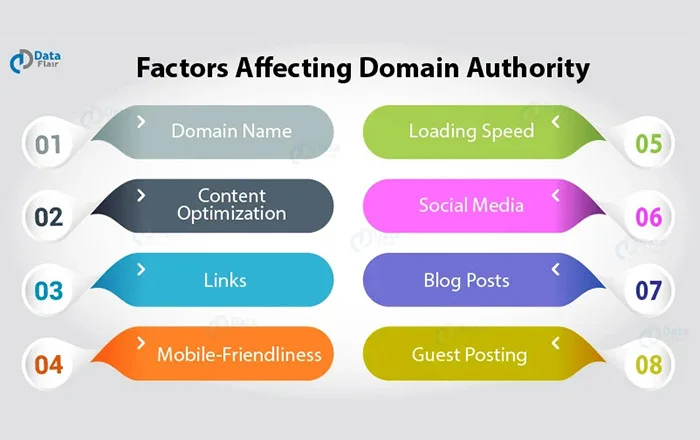Domain Authority for SEO: Unveiling Its Significance

Domain Authority is a metric used to measure the strength of websites in relation to one another.
It allows search engines such as Google and Bing, as well as digital marketers, to evaluate how authoritative or credible a website may be on particular topics.
As an integral part of Search Engine Optimization (SEO), Domain Authority helps make it easier for websites with high scores to achieve greater visibility and organic traffic through higher rankings on search results pages.
This article looks at the significance of achieving a good Domain Authority score when optimizing content for SEO purposes, and examines its importance within various aspects related to SEO including backlinks and page optimization strategies endeavors into potential tactics that can help improve domain authority scores over time.
Domain Authority
Domain Authority is a metric developed by Moz that measures the authority of any given domain on the web. It uses an algorithm to measure how well a website will perform in search engine rankings based on its backlinks, social media signals, and other SEO factors.
Domain Authority scores range from 0-100; higher numbers indicate greater potential for good search ranking results. A high score shows trustworthiness in content quality, relevance, and influence while low scores suggest lower value or overall relevance across various SERPs (Search Engine Results Pages).
How Domain Authority is Calculated
It was first developed by Moz as part of its SEO suite, but other tools have emerged since then such as Ahrefs Domain Rating and Majestic's Trust Flow.
DA is calculated based on various factors including:
- Total number of links to external sites from the website in question
- Quality/authority level link profile
- Trustworthiness/reputation scores taken from ratings or similar metrics supplied by third-party sources which analyze aspects like spam features accordingly
- Overall site performance compared with others within the industry vertical
Factors that Influence Domain Authority
1. Quality and quantity of inbound links
The quality and quantity of inbound links are critical elements to consider when determining Domain Authority. Quality refers to the credibility, trustworthiness, authority, relevance and value that comes with each link pointing back to a website.
A link from an authoritative source will be weighted more heavily than one from a lower-ranking site. Quantity is also important as too few or too many low-quality links can impact rankings negatively; however having numerous high-value backlinks gives sites higher scores for Domain Authority purposes.
2. Relevance and authority of linking domains
When evaluating the quality of backlinks, Google looks at how relevant or authoritative is the source giving said link; if it has been established as an expert in its field with other websites also linking to it, then such links carry more weight than lower-authority ones.
The relevance part means that you should aim for obtaining high-quality links from sites related to your own niche—for example, social media profiles connected directly to your owns site will rank better than random unrelated blog posts referring people offsite. Ultimately, when building up your DA score through acquisition different kinds of prestigious external sources becomes essential.
3. Overall website's reputation and trustworthiness
One of the most important factors that influence Domain Authority is a website's reputation and trustworthiness. Search engine algorithms highly value domains with good reputations, as it reflects on their reliability in providing accurate information to
searchers. Such domain names will often enjoy higher rankings for related queries in search results pages due to this level of trust from Google and other search engines. This means websites should strive towards creating content that offers real answers or solutions for their audience instead quantity-over-quality approach if they want to stay ahead when it comes increasing its Domain Authority overtime.
The Relationship between Domain Authority and SEO

SEO and its goals
SEO, or Search Engine Optimization, is the process of optimizing websites and webpages to achieve higher rankings on search engine result pages. Its main goals are to increase visibility in SERPs by improving both quantity and quality of website traffic from organic searches.
Achieving a high Domain Authority score can be an effective way for sites to improve their SEO performance as it allows them if better visibility with Google's algorithms which place great emphasis on
authority scores when deciding on page ranking positions within its results.
Role of Domain Authority in SEO
Domain Authority is a metric used to measure the strength of websites. It represents a website's overall credibility and trustworthiness, which are essential factors for successful SEO efforts. Search engine algorithms use Domain Authority as an indication of quality when ranking results in their search engine pages – higher authorities will typically prioritize higher-ranked sites over lower-authority ones.
As such, improving your site’s Domain Authority can help you attain better rankings on SERPs (Search Engine Results Pages), leading to increased visibility and organic traffic for businesses or brands utilizing it properly.
Search engine algorithms and their reliance on Domain Authority
1. Google's emphasis on authority and quality
Search engine algorithms rely heavily on Domain Authority to identify a website’s trustworthiness and relevance. Google, in particular, places an emphasis on authority as well as quality; websites with high-quality content that earn links from authoritative domains are more likely to rank higher than those without these qualities. Additionally, increased Domain Authority means improved visibility in search results pages and greater organic traffic that helps the site reach its intended audience faster than ever before.
2. Impact of Domain Authority on search engine rankings
Search engine algorithms heavily rely on Domain Authority when it comes to ranking pages in their search results. This, as Moz explains, is due to the fact that higher Domain Authority indicates a website’s authority and trustworthiness — two crucial factors for SEO success. Websites with high DA have better chances of appearing closer to the top positions or even securing a spot on page one of SERPs (search engine result pages).
Additionally, Google's algorithm pays close attention not only to these quantifiable metrics but also looks at quality signals – thus putting extra emphasis on authoritative domains compared those without any reputation online.
Benefits of a High Domain Authority for SEO

1. Improved search engine rankings
Having a high Domain Authority can have an immense impact on SEO performance and search engine rankings. It is especially beneficial for improving the chances of appearing in the top SERP (search engine results page).
When websites with higher domain authority are actually displayed first, users will be more likely to click on them over lower-ranking pages due to their perceived credibility and trustworthiness.
To improve these odds even further, website owners should focus on acquiring quality backlinks from authoritative sources, creating relevant content that's optimized for keywords & meta titles/descriptions as well as increasing social signals through active presence across platform - all efforts which will raise overall domain relevance score while also contributing towards boosting its DA number itself.
2. Enhanced credibility and trust
Having a high Domain Authority can translate to increased credibility and trust for businesses. That's because the higher your GA,the more authoritative search engines will perceive you as an expert in that particular field or industry.
This translates into how users view and assess your website, creating an impression of authority which further builds user confidence when consuming content from websites with a good DA score compared one with low scores.. A high quality source they're able to rely on also helps cultivate brand loyalty over time versus customers having no perceived affiliation towards any single entity.
3. Amplified organic traffic
Greater exposure to potential visitors
Amplified organic traffic is an important benefit of having a high Domain Authority. With higher
visibility in search results and increased chances of appearing on the first page, websites with a good DA will be able to attract more potential visitors coming from organic sources. This can substantially boost website engagement levels by driving quality visits resulting in conversions or other desirable outcomes such as better brand recall or improved sales figures.
Higher click-through rates from search engine results pages
An increased Domain Authority can lead to amplified organic traffic and higher click-through rates on search engine results pages. As websites rocket up the rankings, people are more likely to view them as authority figures in their field which increases the trustworthiness of a website’s content thus increasing availability for potential visitors while simultaneously making searching easier due to better optimization.
The result is an uptick in clicks from users seeing your site appearing first or prominently within their searches because they feel confident that you will now provide relevant answers with quality information based off of the heightened credibility associated with improved ranking positions.
Strategies to Improve Domain Authority

1. Generating high-quality and relevant content
Generating high-quality and relevant content is essential for improving Domain Authority (DA). To create authoritative pieces that attract and influence organic traffic, website owners must focus on topics that are related to their area of expertise. Additionally, it's critical to make sure the posts contain accurate information as well as evidence or research from credible sources in order to encourage readers' trustworthiness.
The titles should also be optimized with appropriate keywords so search engines can quickly find them. Lastly, all written material needs regular updates and maintenance so visitors always have access up-to-date verified data when they visit a page associated with DA optimization.
2. Building a strong backlink profile
Building a strong backlink profile is an important factor in improving Domain Authority. Acquiring
authoritative and trustworthy links from other websites relevant to your niche helps create credibility for yours, as search engine algorithms place emphasis on the quality of sources linking to one another.
Furthermore, avoiding low-quality or spammy backlinks is essential lest it negatively impacts internet security systems used by crawlers and damage website performance rankings instead. With these strategies utilized effectively, organic growth should be seen over time across various metrics related with higher domain authority scores such as increased page visibility and web traffic generation chances.
3. Enhancing on-page optimization
Enhancing on-page optimization is a key strategy for improving Domain Authority. This includes optimizing website structure and navigation to ensure that pages are easy for search engine crawlers to navigate, as well as implementing relevant keywords throughout content and meta tags in order to increase relevancy with specific topics or queries.
Additionally, it's important that webpages include internal linking between them sovisitors can find related information more easily without having the leave the current page they're viewing. Finally, using HTML coding correctly ensures further visibility from search engines which will result in increased organic traffic flowing into your site.
4. Increasing social signals and engagement
Increasing social signals and engagement is an effective way to improve Domain Authority. Social media platforms such as Facebook, Twitter, Instagram should be leveraged for increased visibility with the help of active presence on them.
Additionally, encouraging social sharing and interaction by creating meaningful content can also bolster organic traffic from these sites which in turn will contribute to a higher Domain Authority score. Lastly implementing calls-to-action that direct users back to its website may result into further optimal results towards increasing ROI (Return On Investment).
Conclusion
In conclusion, Domain Authority is an important factor to consider in SEO efforts. It plays a vital role when it comes to determining search engine rankings since higher domain authority can lead to improved visibility and organic traffic from potential visitors.
Furthermore, by focusing on strategies that help increase Domain Authority such as generating high-quality content and building strong backlinks profiles, websites may be able to gain favor with popular search engines like Google which privileges sites of more authoritative reputation. Ultimately monitoring the impact these measures have on Domain Authority should also take place regularly so needed tweaks or adjustments can be made if necessary for further improvement down the line.
Need help prospecting backlinks? That's where we come in. Get in touch!


.svg)


.jpg)
.jpg)